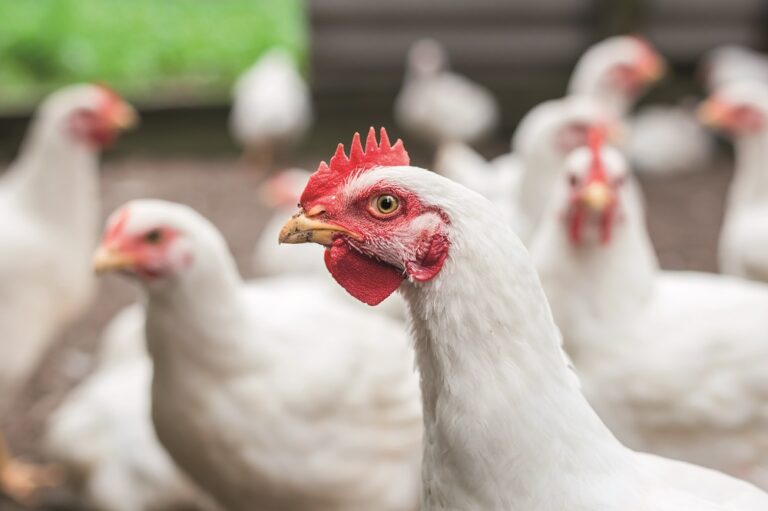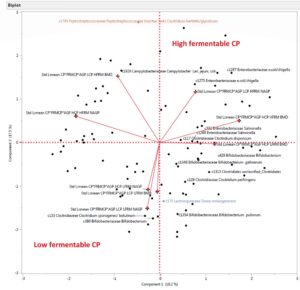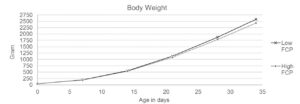The UK poultry industry has made significant progress in reducing the use of therapeutic antibiotics. Managing the diet and taking advantage of new developments can aid this further.
By Daniel Palcu, Cargill’s poultry technical manager
The challenge for the broiler industry is to ensure the responsible use of antibiotics and meet consumer demand while, at the same time, ensuring that there are no negative effects on bird performance or welfare.
The broiler feed industry is developing measures to improve bird health and performance. This may help to reduce our reliance on therapeutic antibiotics.
In the past, we’ve turned to these antibiotics to alleviate the symptoms associated with wet litter, or a reduction in feed intake and growth rates. The causes of these symptoms are typically related to gut health and microflora, and general bird health. Improvements in these areas that improve the digestive tract and promote the optimum balance of microflora in the gut should improve overall bird health.
Early infections
Many health issues in broilers originate from early infections at the hatchery or shortly after placement as day old chicks (DOC) on the growing unit.
Field data shows that the largest part of antibiotic usage is applied during the first week of life.
Chick quality and brooding conditions are crucial for an optimal start for a high-health-status bird. So it is essential for the hatchery and growing unit to work closely together.
Nutrition ‘takes all’
Improvements in feed quality and ration formulation can be major contributors to reducing therapeutic antibiotic use while maintaining bird performance.
Feed quality and precise rationing is paramount. The industry is responsible for selecting and using high-quality raw ingredients and in knowing the profile of these raw ingredients.
Cargill maintains a database, which is constantly updated – of the profile of more than two million raw ingredients, making it the biggest such database in the world.
Combined with NIR calibrations, we can determine the nutritional value of each ingredient. Cargill’s Nutrition System uses this information and allows us to match the precise nutritional information with the bird’s requirements. The in depth knowledge of ingredients and of requirements at each growth stage means that supply can be matched with demand very precisely.
Improved digestive tract
A precisely balanced diet, that supports the digestive tract and generates the ideal balance of microflora will promote a healthy bird.
Chickens undergo significant physiological transitions after hatching, and precise nutrition plays a key role in the developing of the gastrointestinal tract and of the immune system. Nutrition from hatch to day seven, therefore, has both short- and long-term effects on the overall health status of birds.
Cargill trials have shown that an enhanced diet in the early stages, that includes a pre-starter feed between days four and seven, followed by a starter feed, generates better feed intake and performance compared with using only a starter feed for the whole period. Results show a body weight improvement of 25g at day seven and of 125g at day 35 (see Figure 1).
This pre-starter feed has been developed to promote intake and aid digestion by including highly digestible protein sources and fats and it is also presented in a smaller pellet size.
Figure 1. Performance of birds: pre-starter and starter versus starter feeds
(Source: Cargill Innovation Centre, Velddriel, The Netherlands)
Protein quality
A second dietary development in the broiler sector, targeting reduced reliance on antibiotic use, is the inclusion of lower fermentable crude protein levels in grower diets, from the starter diet onwards.
High dietary levels of fermentable crude protein increase proteolytic fermentation and are associated with wet litter and increased levels of Clostridiaceae in the gut.
In a broiler trial, reducing fermentable crude protein level of the feed improved bird performance and the composition of the gut microflora was enhanced. Figure 2 shows how bird weight improved by 150g at day 34 for birds on low fermentable crude protein diets, compared with those on diets with high levels.
Figure 2: Comparison of body weight to day 35 of broilers fed low and high FCP
Fermentable crude protein levels can be assessed using biomarkers to identify the microbial profile. The bacterial strains within this profile are plotted on a graph shown in Figure 3; those with high fermentable crude protein contents are in the top half and those with low levels are in the bottom half.
Those birds fed diets with a low level of fermentable crude protein had a higher proportion of Bifidobacterium, Clostridium botulinum and Dorea romicigenerans in their microflora, which are considered preferable to the microflora found in those birds fed diets with high fermentable crude protein. The latter had more bacteria in their microflora associated with E coli, Salmonella and Campylobacter.
By adjusting the fermentable crude protein levels in the broiler diet producers can, therefore, fine tune the gut microflora and reduce the birds’ likelihood of being predisposed to disease.
Other factors, such as the use of coarse fibre in diets and drinking water supplements including electrolytes and vitamins and minerals in the first four days of age, will also enhance digestive tract development and bird health, with the knock-on effect of reducing the reliance on antibiotic use.
Successful production of broilers without therapeutic antibiotics will require a holistic approach starting with the production of strong day-old chicks and supporting health during grow-out.
Housing and ventilation are two vital in maintaining flock health, and there is a lot of variation in UK growing units. Water quality too must be checked, particularly where the supply is from a bore hole on the farm.
One wrong factor can have a knock-on effect on overall bird performance. It comes down to attention to detail. And this is even more important if producers are not to rely on the safety net of antibiotics.




